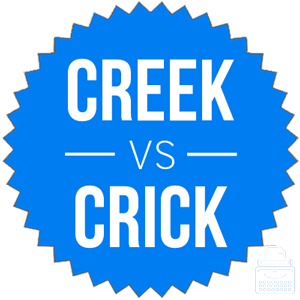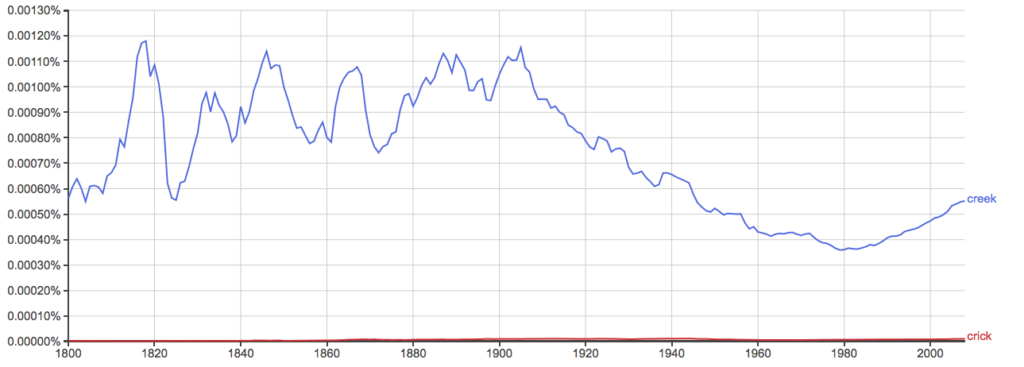The English spoken by many Americans is much different than the formal English taught in public schools and language courses. Spoken English is rife with slang, regional variations, and dialectical words.
Creek and crick are excellent examples. Both nouns can refer to the same object, but only one of them is Standard English. Still, both words appear in published writing, even classic American fiction.
Which version should you use? Continue reading to learn more about these confusing words.
What is the Difference Between Creek and Crick?
In this post, I will compare creek vs. crick. I will use each word in at least one example sentence, so you can see how it appears in context.
Plus, I will share a mnemonic device that will help you when you need to choose either creek or crick in your own writing.
When to Use Creek
 What does creek mean? Creek is a noun and is a small river. Creeks are usually shallow and may dry up during the warmer seasons when there is not enough rain or snowmelt to feed into them. In some ways, creek is a synonym of stream, when stream also refers to a small river.
What does creek mean? Creek is a noun and is a small river. Creeks are usually shallow and may dry up during the warmer seasons when there is not enough rain or snowmelt to feed into them. In some ways, creek is a synonym of stream, when stream also refers to a small river.
Here are some examples,
- We found a muddy creek in April, but when we went back to find it again in August, it had completely dried.
- If you walk through the forest often enough, you will probably find creeks that are too small to be named on maps.
Creek is part of several idioms. The most common is probably up a creek, which usually implies without a paddle, and signifies an unfortunate position. Creek also has a homophone, creak, which means a squeaking noise, and is unrelated.
When to Use Crick
 What does crick mean? Crick is also a noun and has two main meanings. The first is a stiff feeling in the back or neck.
What does crick mean? Crick is also a noun and has two main meanings. The first is a stiff feeling in the back or neck.
For example,
- Edgar developed many new cricks and pops as he aged into his 60s.
Crick can also be a dialectical variant of creek, which more closely resembles the pronunciation of the word by certain regional speakers.
Crick is common in American fiction, such as the work of Mark Twain. In Twain’s The Adventures of Huckleberry Finn, for instance, the characters Tom and Huck happen across several cricks in their wanderings. Writers often use crick to inject a feeling of rural authenticity into their dialogue.
For example,
- “Let’s cross the crick into the meadow to get off Farmer Ben’s property!” said Angus.
Other than these regional considerations, there isn’t much of a reason to ever use crick in your writing.

As you can see in the above chart, which graphs crick vs. creek, the disparity in the written use of these words is overwhelming. Creek is the only standard spelling of the word, and crick doesn’t make its way into professional writing outside of specific bits of fiction.
Trick to Remember the Difference
If you are describing a shallow stream, it would be better to use creek. Crick is, at best, an American dialectical variant. You can use the word to your advantage in fiction writing, but for other situations, creek is probably the better option.
Since creek and stream both contain the letter E, you can easily remember that creek is the better choice for most writing.
Summary
Is it crick or creek? Creek is a noun that refers to a shallow stream. Crick is an American dialectical variant that is popular in some genres of fiction. Creek is the standard term in all other contexts.
To summarize,
- Creek is the standard spelling for professional writing.
- Crick is a regional variant that better reflects the pronunciation of some speakers.
Contents
